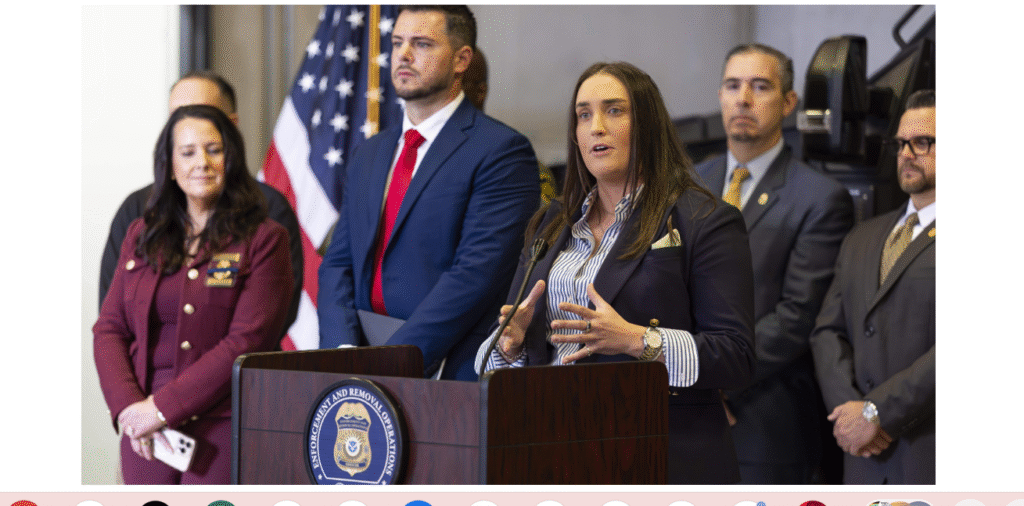State and federal authorities in Florida have arrested over 200 people convicted of sex crimes who were unlawfully in the United States — the latest collaboration between the Trump and DeSantis administrations on immigration enforcement.
During a press conference at the Miramar office of Immigration and Customs Enforcement on Tuesday morning, officials announced “Operation Criminal Return,” also known as “Operation Dirtbag.” Over 10 days, law enforcement officials rounded up immigrants convicted of serious crimes.
“These heinous criminals have gone on to attack children at their most vulnerable state, and law enforcement has stepped up to the plate to remove them from the communities,” said Madison Sheahan, deputy director of ICE.
Sheahan said that fifty-four were classified as sexual predators and another 164 were offenders of sexual crimes. Two were convicted murderers. All had final deportation orders.
The announcement also doubled as a call from the Trump administration for other states to follow Florida’s lead in assisting on immigration enforcement efforts. Sheahan and other officials touted the Sunshine State’s involvement in the 287(g) program, an ICE partnership that grants limited immigration-enforcement powers to local police departments. With over 335 agreements, Florida is the state with the highest number of 287(g) collaborations. Trump officials view collaboration from local police departments as a cornerstone of the White House’s mass deportation agenda.
“It really sets a model to the nation of what it looks like when the federal government and the state government is able to work together to effectuate change, we’re able to work side-by-side as partners,” said Sheahan.
The operation follows a previous sting in April, known as Operation Tidal Wave, that led to the arrest of over 1,000 people in Florida, and at the time was described as the largest joint operation in history of that nature. Anthony Coker, Florida’s executive director of immigration enforcement, said during the Tuesday press conference that it was an “all-hands on deck approach” and that every state agency had active credentials and had made arrests under the 287(g) program.
“Our state has leaned forward on immigration…. These are some of the worst child molesters, rapists, murderers that have been in and out of your community for a long time. And we’re not going to stand for it anymore,” said Mark Glass, commissioner of the Florida Department of Law Enforcement.
Behind the officials at the conference Tuesday were American flags, a black van for a special response team, and photos of some of those arrested, hailing from Cuba, Venezuela and Ukraine. Melisa Bujeda, who heads the missing persons and offenders enforcement within the FDLE, explained how she had drafted a plan that she presented to others in her department.
The widespread implementation of the 287(g) program in Florida has come under fire from activists and experts, who say that it makes community policing less effective because people will underreport crimes. They also point to a 2011 investigation from the Department of Justice that found that Arizona police officers in the program were racially profiling Hispanics. Governor Ron DeSantis has also found himself in direct conflicts with local governments.
But beyond the 287(g) collaborations, Florida has also found other unprecedented ways to assist in immigration enforcement at the state level. In July, it opened up a state-run immigration facility deep in the Everglades known as Alligator Alcatraz. Florida also created another facility in Baker County called “Deportation Depot,” and is planning a third one called “Panhandle Pokey” in the northern part of the state. Immigration detention facilities have typically fallen under the federal government’s purview.
Sheahan said her agency worked within the laws that Congress had written. She urged undocumented immigrants to self-deport so they can avoid having to interact with immigration law enforcement.
“Anybody who is in this country illegally we will continue to go after, and target anybody who is in our targeting system, whether you have a final order or we come across you in our 287(g) efforts,” Sheahan said. “Our job is to keep the community safe.”
By SYRA ORTIZ BLANES/Miami Herald
Syra Ortiz Blanes covers immigration for the Miami Herald and El Nuevo Herald. Previously, she was the Puerto Rico and Spanish Caribbean reporter for the Heralds through Report for America.



